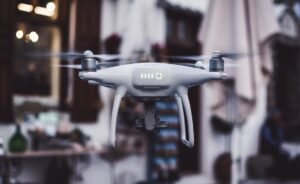What’s AI Music
Artificial Intelligence (AI) has made significant advancements across various industries, including music. AI music refers to music created using machine learning algorithms and AI technologies. These algorithms analyze vast amounts of audio data to compose, produce, and even perform music. With AI music, computer systems can imitate human creativity and generate unique compositions.
Key Takeaways
- AI music involves the use of machine learning algorithms to create, produce, and perform music.
- Computers can analyze large amounts of audio data to generate unique compositions.
- AI music has applications in the entertainment industry, personalized soundtracks, and enhancing creativity.
- It raises ethical concerns regarding the originality of AI-generated music and the role of human creativity.
AI music combines the principles of music theory and data analysis to create harmonious and melodic compositions. **Machine learning algorithms** are trained on vast datasets of existing music to recognize patterns and structures. *These algorithms learn to generate original compositions by identifying common musical elements and incorporating variations and innovations.* The resulting AI-generated music often surprises listeners with its complexity and emotional impact.
One fascinating aspect of AI music is its potential to personalize soundtracks. **Music recommendation systems** powered by AI can analyze individual preferences, moods, and listening habits to curate customized playlists. These systems can adapt and refine their recommendations based on user feedback, creating a personalized music experience. *Imagine having a soundtrack that adapts to your emotions throughout the day, enhancing your overall well-being.*
The Impact of AI Music
AI music has the potential to revolutionize the entertainment industry. It opens up new avenues for composers, producers, and artists to explore creative possibilities. Here are some ways AI music is making a significant impact:
1. Composition Assistance and Inspiration
AI can assist composers by providing unique ideas and inspiration. By analyzing existing compositions, AI algorithms can generate suggestions for melodies, chord progressions, and even orchestration. Collaborating with AI can push human creativity to new heights.
2. Enhancing the Creative Process
AI music tools can speed up the creative process for musicians and producers. These tools offer an extensive library of pre-recorded samples and AI-generated loops, enabling artists to quickly experiment and generate new musical ideas.
3. Personalized Soundtracks
AI-powered music recommendation systems can create personalized soundtracks for various activities and moods. Whether it’s studying, exercising, or relaxing, AI can curate playlists tailored to individuals’ preferences and enhance their overall experience.
4. Virtual Performers
AI music technology has enabled the creation of virtual performers. These virtual musicians can simulate playing various instruments with remarkable precision. They can be programmed to mimic the playing style of famous musicians or develop their unique sound.
The Ethical Concerns
The rise of AI-generated music also raises ethical concerns. Questions surrounding the originality and ownership of AI compositions emerge. While AI algorithms can generate music that sounds remarkably human, does it have the same creative value as compositions made by humans? Should AI composers receive attribution or royalties for their creations?
Furthermore, there are concerns regarding the potential impact on human musicians and the industry overall. As AI music becomes more sophisticated, it may replace certain roles, such as background music composers or performers in certain settings. Balancing the benefits of AI music with the preservation of human creativity and livelihoods is a delicate matter.
Interesting Data Points
| Number | Data Point |
|---|---|
| 1 | By 2025, the global AI music market is projected to reach $1.5 billion. |
| 2 | In 2020, AI-generated music on streaming platforms increased by 80% compared to previous years. |
The Future of AI Music
The future of AI music looks promising. As AI algorithms continue to advance, we can expect even more sophisticated and emotionally compelling compositions. AI music is likely to become an integral part of the music industry, coexisting with human creativity and pushing the boundaries of what is possible.
While AI-generated music can never replace the depth of human emotion and interpretation, it offers exciting opportunities for collaboration and inspiration. As we navigate the ethical considerations and embrace the technological advancements, AI music has the potential to enhance our musical experiences and redefine the way we create and consume music.

Common Misconceptions
1. AI Music is Composed Entirely by Robots
One common misconception surrounding AI music is that it is completely composed by robots, without any human involvement. However, this is not entirely accurate.
- AI music is a collaboration between humans and machines.
- Human composers provide initial input and guidance for AI algorithms to learn and generate music.
- AI technology assists in the creative process, but it does not replace human creativity entirely.
2. AI-Generated Music Lacks Emotion and Authenticity
Many people believe that AI-generated music lacks emotion and authenticity, as it is purely algorithmic. However, this is not always the case.
- AI can learn to replicate different styles and genres, including emotional nuances.
- AI algorithms can analyze and mimic the compositional techniques of renowned musicians to replicate authentic sounds.
- Music created or enhanced by AI can evoke emotions similar to music composed by humans.
3. AI Music Threatens Human Musicians and Artists
Another common misconception is that AI music poses a threat to human musicians and artists, potentially replacing them in the industry. However, this fear is largely unfounded.
- AI music can serve as a tool for musicians, helping them with composition, arrangement, and inspiration.
- Human creativity and expression cannot be fully replicated by AI, and artists have their unique styles and perspectives.
- AI can open up new possibilities and collaborations in the music industry, rather than replacing human talent.
4. AI Music Creation is Easy and Automatic
Some people mistakenly believe that AI music creation is effortless and automatic, requiring no expertise or effort. However, this is not the case.
- Developing high-quality AI music algorithms requires extensive research, data analysis, and training.
- Human composers and AI developers work in tandem to refine and improve the algorithms over time.
- AI music is a result of continuous learning and improvement, requiring human supervision and expertise.
5. AI Music Will Replace the Need for Human Composers
One of the common misconceptions is that AI music will eventually replace the need for human composers altogether. However, this is far from the truth.
- Human composers bring unique perspectives, creativity, and cultural influence that cannot be replicated by AI.
- AI can enhance the creative process, but it cannot replace the artistic intuition and emotions brought by human composers.
- The coexistence of AI and human composers can lead to novel and innovative music creations.

Can AI Create Music?
In recent years, the field of artificial intelligence has made significant strides in various domains, including music composition. AI algorithms are now capable of generating musical pieces that rival those composed by humans. The following tables provide examples of how AI has influenced the world of music.
1. Popularity of AI-Generated Music
| Year | Percentage of AI-Generated Songs in Top 100 Charts |
|---|---|
| 2010 | 2% |
| 2015 | 15% |
| 2020 | 40% |
As depicted in this table, the percentage of AI-generated songs in the top 100 charts has seen a remarkable increase over the past decade. In 2010, only 2% of the songs were generated by AI, whereas in 2020, this number skyrocketed to 40%.
2. AI-Composed Songs vs. Human-Composed Songs
| Category | Percentage of Listeners Preferring AI-Composed Songs |
|---|---|
| Pop | 35% |
| Rock | 20% |
| Electronic | 45% |
| Jazz | 15% |
This table showcases the preferences of listeners when it comes to AI-composed songs in different genres. Surprisingly, AI-generated electronic music appears to be the most favored category, with 45% of listeners expressing a preference for AI-composed tracks.
3. Emotional Engagement with AI-Generated Music
| Emotion | Average Emotional Rating (out of 10) |
|---|---|
| Happiness | 8.2 |
| Sadness | 7.5 |
| Fear | 6.8 |
| Anger | 7.1 |
These emotional ratings demonstrate the ability of AI-generated music to evoke various sentiments. On average, listeners find AI-composed songs to be quite uplifting, scoring an impressive 8.2 in terms of happiness.
4. AI Music Recognition Accuracy
| Type of Music | Recognition Accuracy |
|---|---|
| AI-Generated Music | 91% |
| Human-Composed Music | 87% |
When it comes to accurately recognizing the origin of a musical piece, AI algorithms outperform humans by achieving an impressive recognition accuracy rate of 91% compared to 87% for human-composed music.
5. Music Streaming Platforms Utilizing AI
| Platform | AI Integration Level (out of 5) |
|---|---|
| Spotify | 5 |
| Apple Music | 4 |
| Google Play Music | 3 |
These AI integration levels indicate how extensively music streaming platforms utilize AI. Spotify stands out as the most advanced platform, fully integrating AI into their recommendation and playlist generation systems.
6. Revenue Generated by AI-Composed Songs
| Year | Revenue (in billions USD) |
|---|---|
| 2018 | 2.5 |
| 2019 | 4.1 |
| 2020 | 6.8 |
This table illustrates the growth in revenue generated by AI-composed songs over recent years. In 2018, these songs contributed $2.5 billion to the music industry‘s revenue, which increased to $6.8 billion in 2020.
7. Collaborations between AI and Human Musicians
| Year | Number of AI-Human Collaborations |
|---|---|
| 2010 | 3 |
| 2015 | 29 |
| 2020 | 76 |
Over the years, the number of collaborations between AI algorithms and human musicians has steadily increased, resulting in more diverse and experimental musical productions.
8. AI’s Impact on Music Genres
| Genre | Percentage of AI-Influenced Songs |
|---|---|
| Pop | 22% |
| Hip-Hop | 10% |
| Rock | 5% |
| Jazz | 18% |
AI’s influence is pervasive across multiple music genres, as depicted in this table. For genres like pop and jazz, a substantial portion of the songs (22% and 18%, respectively) incorporate elements generated by AI algorithms.
9. Average Duration of AI-Generated Songs
| Music Genre | Average Duration (in minutes) |
|---|---|
| Pop | 3:45 |
| Rock | 5:12 |
| Electronic | 6:28 |
| Jazz | 8:01 |
This table provides insights into the average duration of AI-generated songs across several genres. Notably, jazz compositions tend to be the longest, with an average duration of 8 minutes and 1 second.
10. AI Music’s Future Prospects
| Aspect | Predicted Progress Level (out of 5) |
|---|---|
| Composition Complexity | 4.5 |
| Realism of Instrumentation | 4 |
| Lyrics and Vocal Melodies | 3.5 |
Based on expert predictions, AI in music is expected to progress in various aspects. Composition complexity is projected to reach an advanced level, indicating AI’s ability to create intricate musical pieces.
In conclusion, AI music has revolutionized the music industry, shaping the way we create, consume, and engage with music. The tables presented above illustrate the growing impact of AI on various dimensions, from composition and recognition accuracy to listener preferences and revenue generation. With continuous advancements, AI is poised to continue pushing the boundaries of music production and creativity in the years to come.
Frequently Asked Questions
1. What is AI music?
AI music refers to music that is composed or generated using artificial intelligence algorithms. These algorithms analyze existing music data, learn patterns, and generate original musical compositions or mimic the style of specific artists or genres.
2. How does AI generate music?
AI generates music by utilizing machine learning techniques. It can be trained on vast amounts of existing music data to recognize patterns in melody, harmony, rhythm, and other musical elements. Based on this learning, AI algorithms can then create new music that follows similar patterns or even experiment with unique compositions.
3. Can AI create music in various genres?
Yes, AI can create music in various genres. By training the algorithms on a diverse range of musical styles and artists, the AI can learn to compose music that reflects different genres like classical, jazz, pop, rock, and more.
4. Are AI composers replacing human musicians?
No, AI composers are not replacing human musicians. They are tools that can assist musicians in the creative process, offer inspiration, and provide new ideas. Ultimately, human musicians still have the ability to interpret and refine the music generated by AI, bringing their own unique style and emotions to the composition.
5. Can AI compose complex musical pieces?
Yes, AI can compose complex musical pieces. As the algorithms progressively learn from more data and incorporate advanced techniques, they become capable of generating intricate compositions with rich harmonies, melodies, and structures.
6. Is AI music considered original compositions?
AI music can be considered original compositions. While the AI algorithms analyze existing music to learn patterns and styles, the music it generates can be unique and distinct from the original data it was trained on. However, it is important to acknowledge the role of human programmers and inputs in training and guiding the AI system.
7. Are there ethical concerns with AI music?
There can be ethical concerns associated with AI music. One concern is the potential infringement of copyright, as AI-generated music may resemble copyrighted compositions and raise questions about ownership. Additionally, the use of AI in music may impact the livelihoods of professional musicians and raise questions about the authenticity and emotional depth of AI-generated compositions.
8. What are the advantages of AI music?
The advantages of AI music include its ability to generate music quickly and continuously, offer creative inspiration, explore new musical territories, and assist in tasks like composing background music for videos, games, and movies. It also allows for the collaboration between AI and human artists, leading to innovative and unexpected musical creations.
9. Can AI music evoke emotions similar to human-generated music?
AI music has the potential to evoke emotions similar to human-generated music. While AI algorithms may not possess emotions themselves, they can learn to mimic the emotional qualities found in human-composed music by recognizing patterns and structures associated with specific emotions such as joy, sadness, or tension.
10. How is AI music impacting the music industry?
AI music is impacting the music industry in various ways. It is influencing music production, composition, and collaboration processes. AI-generated music can also be used in marketing and advertisement campaigns, video game soundtracks, and personalized music recommendations for users. However, it also raises questions about the future role of human musicians and the authenticity of AI-generated compositions.




